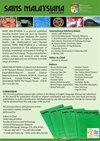菟丝子总酚含量的动力学研究。用亚临界水提取叶子
IF 0.7
4区 综合性期刊
Q3 MULTIDISCIPLINARY SCIENCES
引用次数: 0
摘要
酚类化合物的绿色植物提取由于其优点,仍然具有挑战性和吸引力。以总酚含量(TPC)测定的胡椒酚类化合物解吸速率的控制机制。(PBL)叶片使用亚临界水,并研究了一个单点动力学解吸模型(一阶)。单点动力学解吸模型通过解吸和扩散机制很好地解释了亚临界水从PBL叶片中提取酚类化合物的机理。该模型与实验数据相吻合,并很好地描述了提取机理,R平方为0.94。使用亚临界水从PBL叶片中回收TPC受到颗粒内扩散、温度和提取时间的影响。单点动力学解吸模型中的解吸速率常数从100°C增加到200°C(0.3975±0.02到3.3045±0.00 min-1),然后降低到250°C(3.2093±0.00 min-2)。最高TPC在200°C下快速恢复5分钟。此外,在175°C的较低温度下,缓慢解吸30分钟,也获得了TPC的高产率。酚类化合物从PBL叶片中扩散的低活化能为8.964kJ/mol。这一结果表明,亚临界水萃取的单点动力学解吸模型有很好的机会应用于从PBL叶中回收酚类化合物。本研究获得的单点动力学解吸速率常数和数学动力学模型方程可以控制亚临界水提取PBL叶中酚类化合物的质量。本文章由计算机程序翻译,如有差异,请以英文原文为准。
Kinetic Study of Total Phenolic Content from Piper betle Linn. Leaves Extract Using Subcritical Water
The green plant-based extraction of phenolic compounds is still challenging and attractive due to their benefit. The mechanism controlling of desorption rate of phenolic compounds, measured as total phenolic content (TPC), from Piper betle Linn. (PBL) leaves using subcritical water, and a one-site kinetic desorption model (first order) was studied. One-site kinetic desorption model has well explained the extraction mechanism of phenolic compounds from PBL leaves using subcritical water through desorption and diffusion mechanism. This model fits with the experimental data and presents a good description of the extraction mechanism with R-squared of 0.94. The recovery of TPC from PBL leaves using subcritical water was influenced by intraparticle diffusion, temperature, and extraction time. The desorption rate constant in the one-site kinetic desorption model increased from 100 to 200 °C (0.3975±0.02 to 3.3045±0.00 min-1) and then decreased to 250 °C (3.2093±0.00 min-1). The highest TPC was recovered quickly for 5 min at 200 °C. In addition, a high yield of TPC was also obtained at a slow desorption process for 30 min at a lower temperature of 175 °C. The low activation energy for the diffusion of phenolic compounds from PBL leaves of this study was 8.964 kJ/mol. This result showed that the one-site kinetic desorption model of subcritical water extraction has an excellent opportunity to be applicable in phenolic compounds recovery from PBL leaves. The one-site kinetic desorption rate constant and mathematical kinetic model equation achieved in this study might control the quality of phenolic compounds extracted from PBL leaves through subcritical water.
求助全文
通过发布文献求助,成功后即可免费获取论文全文。
去求助
来源期刊

Sains Malaysiana
MULTIDISCIPLINARY SCIENCES-
CiteScore
1.60
自引率
12.50%
发文量
196
审稿时长
3-6 weeks
期刊介绍:
Sains Malaysiana is a refereed journal committed to the advancement of scholarly knowledge and research findings of the several branches of science and technology. It contains articles on Earth Sciences, Health Sciences, Life Sciences, Mathematical Sciences and Physical Sciences. The journal publishes articles, reviews, and research notes whose content and approach are of interest to a wide range of scholars. Sains Malaysiana is published by the UKM Press an its autonomous Editorial Board are drawn from the Faculty of Science and Technology, Universiti Kebangsaan Malaysia. In addition, distinguished scholars from local and foreign universities are appointed to serve as advisory board members and referees.
 求助内容:
求助内容: 应助结果提醒方式:
应助结果提醒方式:


